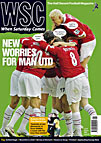 European success hasn't brought Liverpool a new stadium or the funds to compete for the league and, as John Williams writes, fans don't know where the club is going
European success hasn't brought Liverpool a new stadium or the funds to compete for the league and, as John Williams writes, fans don't know where the club is going
Six months on from winning the greatest ever European Cup final in front of (allegedly) the world’s greatest supporters and in a fashion liable to add at least a few million to any top club’s global fan base, you might be forgiven for thinking this could have been just the time for a new lift-off at a club that had been some 15 years off the elite football pace. And yet, what should now be a buoyant Liverpool FC has looked, on occasions, a remarkably rudderless ship since that dramatic, unforgettable night in Istanbul.
First, we had the Steven Gerrard near-fiasco in which a tearful and emotionally insecure Huyton man in search of sporting love came within a bare ciggie paper of leaving Anfield just 41 days after Istanbul. He was surely bound for Mourinho’s romantically wicked lair. And this was when all the Liverpool parties concerned – including the player himself – pleaded that if only they could find a way to allow him to stay at the club, it would be done. Fortunately Gerrard cracked even as the bemused Liverpool hierarchy were waving him off to the waiting London train.
Then there was the Michael Owen dithering “Will he, won’t he” saga, which ended with the England-obsessed Golden One toiling, implausibly, instead for Newcastle United. With Michael now away, a panicky Rafa Benítez then chased around in the last hours of the transfer window, unsuccessfully trying to sign second-rate replacements at exorbitant prices. The 2005 European champions have ended up with a roster of highly paid but unconvincingly tall and shot-shy forwards, while Michael nonchalantly does his usual thing for the Geordies and, of course, England – scoring priceless goals.
Off the field, the by now near-mythical “new stadium” on Stanley Park also seems little closer to happening. This is despite Istanbul and what seems like years of planning and debate – plus a near doubling of the proposed cost. Meanwhile, Anfield’s closest rivals – bar cash-happy Chelsea and ruined Everton, of course – ominously add capacity and money-making assets to their own home sites. David Moores, the laid-back current Liverpool chairman, is under close scrutiny in all of this. The guy’s a Reds fan all right, loyal to the core. But leadership and decisiveness? Even his best friends admit that these are not really his strong suits at all.
At the heated Liverpool AGM in January 2004, when investment rival Steve Morgan was angling to force Moores – and perhaps chief executive Rick Parry – out of the club, Clive Tyldesley then wrote: “Moores has his critics and rivals, but a chairman from the club’s own fan base who provides generous personal and financial support without seeking to interfere or absorb praise is in a minority. If he does fall on his sword next summer, I can think of a few managers who may try to buy him.” True. Except that Graeme Souness and Gérard Houllier would probably be among them: both men lingered far too long under Moores’ overly-paternalistic Liverpool regime.
So what type of men, exactly, do you want in charge of your top football club these days, stumping up the cash? Ideally, they should be fans, of course. The Moores family is local and is also a progressive employer in the city, one that has put its hands in its deep pockets for the club for 40 years or more. Though exactly how much it does so now, especially in these new, frenetic and global football times, remains something of a guarded mystery. And there are real and present dangers in calling for boardroom or investor change.
Inviting in an Abramovich, for example, raises palpable shivers; and the intentions of the corporate Glazers at nearby United Towers look at least questionable. You could, alternatively, easily end up with a Deadly Doug type: a well intentioned man who is solid but lingers, squeezing the life out of your fan heart in the process. Or worse – much worse – a Ken Bates character, rather than a more benign Dave Whelan or a Steve Gibson figure. And just how many quiet and serious guys are out there with real hard cash to spend? Which leaves us, I’m afraid, with the shark-infested waters of global, corporate sporting finance.
The much reported US Kraft family interest in investing in Liverpool FC is no longer easily dismissed by most Reds fans as an intrusive and unwanted intervention from too distant shores. There are, of course, those Reds who would, honourably, carry on as we are under Moores and at an outmoded Anfield, rather than take the Yankee dollar and risk a new regime. But the general fan talk is no longer a simple “No thanks – just not the Liverpool Way” but, instead, a more pragmatic “OK, what do they actually want for their £100 million?” Naming rights for a new ground might now be acceptable to many in this new era, for example. But is this all the Kraft cash will buy in L4? And for all the recent lack of Anfield urgency and direction, sometimes it is as well to remember that asking for more “leadership” from the money men in football can take you down some pretty dark alleyways. Ask Leeds United fans.
From WSC 227 January 2006. What was happening this month
The day Liverpool F.C sell naming tights to their ground is the day the soul of football is finally gobbled up by the corporate dollar.